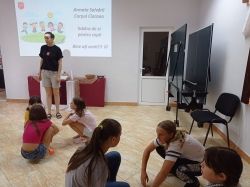International News Briefs - 14 July

International News Briefs - 14 July
The Young People’s workers at Mount Pearl Corps in Canada lead a fun-packed camp session focusing on how God’s power gives hope.
Day camps nurture children’s faith
 The day camps in Moldova are fun and nurturing places for children from various backgrounds.
The day camps in Moldova are fun and nurturing places for children from various backgrounds.
The Salvation Army hosts many activity camps and residential programs for children, young people and adults each year. Every camp has its own missional focus, creative emphasis and identity, underpinned by a commitment to the teachings of the Christian faith.
Volunteers at Mount Pearl Corps in Canada have been running a Vacation Bible School (VBS) for young children from pre-kindergarten to Grade 6, held over multiple weekday evenings. The theme for the program is ‘God’s power gives us hope’.
In the Moldovan capital of Chisinau, Ciocana Corps has also run day camps. Staff and volunteers run games, competitions and recreational activities for the children, many of who come from challenging backgrounds. The (Northern) summer fruits and ice cream are the most popular!
Responding to migrant needs in Poland
 Major Camilla Thomas at the ‘Voice of Migrants’ conference in Warsaw, Poland.
Major Camilla Thomas at the ‘Voice of Migrants’ conference in Warsaw, Poland.
Major Camilla Thomas, Salvation Army regional leader in Poland, recently attended the conference ‘The Voice of Migrants in Poland’, held in Warsaw. Delegates discussed current challenges and possible solutions.
Recent studies show that 87 per cent of women entering Poland arrive without a male partner. There are many older and elderly women. These women rely on their savings, government assistance and non-government organisations, including The Salvation Army. Their savings are running out. Almost 70 per cent of Ukrainian immigrants are ready for work, with 61 per cent having begun to search for work. Their challenges include the language barrier, lack of childcare and housing issues. Six per cent have children with special needs.
Migrants of non-Ukrainian origin, such as African students or other employees, face complex challenges. Most have returned to their country of origin or moved to other European countries in the hope of continuing their studies.
“We see the risk of human trafficking, especially in people who do not want to register in Poland because of the risk of being deported to their country of origin,” said Major Thomas.
“We are helping refugees every day in cities and neighbourhoods where we have corps, and also making refugees aware of human trafficking risks.”
Online launch celebrates global learning potential
 Major Loveth Onuorah takes the audience through a Netsuite timeline presentation at the official launch of the new IFAS program.
Major Loveth Onuorah takes the audience through a Netsuite timeline presentation at the official launch of the new IFAS program.
Teams at International Headquarters recently celebrated the launch of The Salvation Army’s International Financial Accounting Standards (IFAS) program. The IFAS will strengthen the Army’s accounting and finance provision worldwide. This online learning management system will also enable the initiative to be taken on by a greater number of territories and commands.
The IFAS initiative is a set of policies and procedures that all territories should follow or reference in preparing their financial accounting data. It includes the format of reports prepared for IHQ and the KFIs (key financial indicators) that need to be recorded. The new system provides an opportunity for anyone with internet access to receive training to use the new systems accurately.
International Financial Secretary Dr Matthew Carpenter spoke about the new e-learning system as the latest step for the IFAS project that includes a global rollout of cloud-based accounting software (NetSuite) and represents the largest global business project in the Army’s history.
General Brian Peddle reminded the international audience that education is one of The Salvation Army’s core values. “We are breaking down barriers to education,” he said. “The goal of the online learning management system is to centralise, standardise and scale finance education, placing all the content in one place – equally available and readily accessible.”
He added: “We will be better prepared to be accountable for the resources God has placed in our hands. The Salvation Army will be able to move closer to an excellence that brings glory and honour to God.”
IFAS Project Director Major Loveth Onuorah took the audience through a Netsuite timeline, starting with the first implementation in Kenya East Territory in 2017. The number of languages available in Netsuite has now reached 28, with Taiwan the first to use Mandarin.
The event finished with a video presentation that gave a clear message: ‘Let’s start learning’.